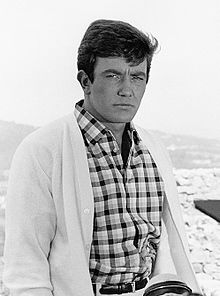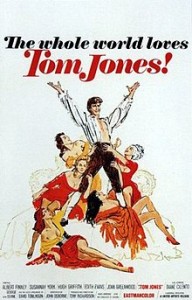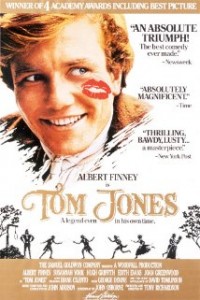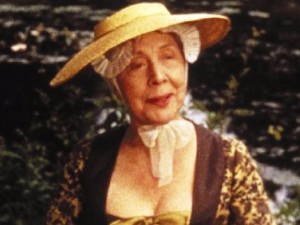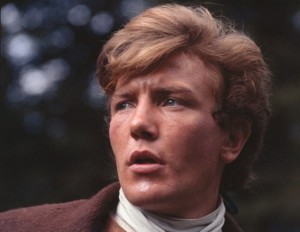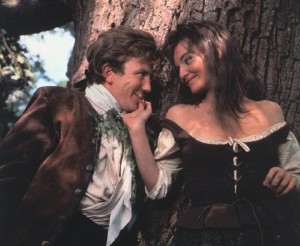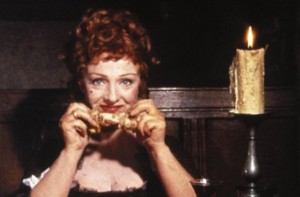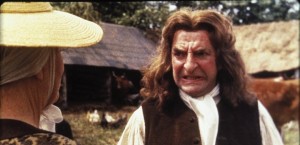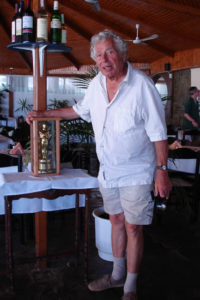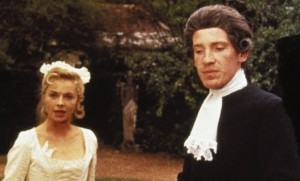Tom Jones ***** (1963, Albert Finney, Susannah York, Joyce Redman, Edith Evans, Hugh Griffith, Diane Cilento, David Warner, Joan Greenwood) – Classic Movie Review 1479
In 1963 movie-goers across the globe fell in love with Albert Finney’s entrancing rogue Tom Jones, and director Tony Richardson’s classic is still as fresh, clever, exciting and exhilarating as the day it was made.
Finney was Oscar-nominated as Best Actor for his enchantingly dashing and boyishly athletic tour-de-force as Henry Fielding’s 18th-century anti-hero, who has lots of merry capers on the way to true love and happiness in John Osborne’s remarkably adroit screenplay, brilliantly adapting a highly respected if rather stodgy doorstop of a novel (The History of Tom Jones, a Foundling). Finney also won the Volpi Cup for Best Actor at the Venice Film Festival.
Tom is an exceptionally lusty young dude, whose sexy looks and kind heart make him a powerful magnet to the entire opposite sex, though he only truly loves one woman, the sweet and demure Sophie Western (Susannah York), who happily returns his love.
But Tom is a foundling and society stigmatises him as a ‘bastard’ so he cannot be allowed to wed such well-bred young lady. So he hides his true feelings and Sophie must hide hers too while her aunt (Edith Evans) and father, Squire Western (Hugh Griffith), try to get her hitched to a man they judge more suitable – the less than sexy Master Blifil (David Warner, in his film debut) – whom naturally she hates.
Ribald but still tasteful, cinematically adventurous but still controlled, the movie is a great tribute to the fervent imagination of director Richardson. The sexy, hilarious tavern scene with bawdy lady Joyce Redman seducing Finney while eating her meal is much parodied and copied – indeed so was the entire film – but it’s still a classic movie moment. Food is definitely sex in this movie.
The boldly conceived film is notable for its free-wheeling comic style, no doubt influenced by the French New Wave. It sets up its dare-to-be-different stall right from the start, with the opening sequence performed in the style of a silent film. Later, it pulls off a risky idea of characters breaking the fourth wall, with the actors looking directly into camera and addressing the audience. At one point, Tom Jones even appears to notice the camera and covers the lens with his hat.
Even if it was risky, it all works a treat. Did they simply take the view that filming Fielding’s book was going to be boring unless the film-makers full imagination and talent were engaged and given free rein? The hunt sequence and the village square scene are exciting standout set pieces, a tribute to cinematographer Walter Lassally.
And Oscar-nominated Hugh Griffith as the squire is another firm favourite among the galaxy of droll supporting performances, so too Joan Greenwood as promiscuous middle-aged noblewoman Lady Bellaston.
Three of the lovely actresses were also Oscar-nominated for Best Supporting Actress: Diane Cilento as the gamekeeper’s daughter, Edith Evans as Miss Western and Redman, but alas, with the vote split, they all lost out to scene-stealing Margaret Rutherford in The VIPs. It’s the only film where three actresses have been nominated for the Best Supporting Actress Oscar.
There were four Academy Award wins. Best Picture, Best Adapted Screenplay, Best Direction and Best Original Score were all deserved victories, though, surprisingly, there were in the end no actor wins when the film is such an obvious performance triumph. Appropriately, Finney is now the owner of its Best Picture Oscar.
It won two Golden Globes – for Best Motion Picture Comedy or Musical and (shared) Most Promising Newcomer Male (Finney) – and three Baftas – Best British Film, Best British Screenplay and Best Film from any Source.
David Tomlinson, Peter Bull, David Warner, Jack MacGowran, George Devine, George A Cooper, Rosalind Atkinson, Rosalind Knight, Patsy Rowlands, Mark Dignam, Avis Bunnage Angela Baddeley, Freda Jackson, James Cairncross and Julian Glover are also in the cast. It is Lynn Redgrave’s début and her mother Rachel Kempson also appears. Michael MacLiammoir narrates the film.
Ironically Bryanston Films hesitated to pay the cost of making the film in colour, and when they did, they duly went bankrupt, but the film was a sensational hit, costing only $1million and taking $57million.
The 1989 American reissue print was cut by Richardson to 122 minutes from its original 129, but the original full-length version is available again on DVD.
Bridgwater’s Castle Street was used as a location in several scenes.
RIP Walter Lassally (18 December 1926 – 23 October 2017), who won the Oscar for Best Cinematography in 1965 for the film Zorba the Greek.
RIP Albert Finney (9 May 1936 – 7 February 2019), who was nominated for the Academy Award for Best Actor four times, for Tom Jones (1963), Murder on the Orient Express (1974), The Dresser (1983), and Under the Volcano (1984). He was also nominated for an Oscar for Best Supporting Actor for Erin Brockovich (2000).
After making his film debut as the villainous Blifil in Tom Jones in 1963, David Warner (29 July 1941 – 24 July 2022) became a star in 1966 with his lead performance in Morgan: A Suitable Case for Treatment. He notably appeared in The Ballad of Cable Hogue, Straw Dogs, Cross of Iron, The Omen, Holocaust, The Thirty Nine Steps, Time After Time, Time Bandits, Tron, A Christmas Carol, Portrait in Evil, Titanic, Mary Poppins Returns, Star Trek V: The Final Frontier and Star Trek VI: The Undiscovered Country,
© Derek Winnert 2014 Classic Movie Review 1479
Check out more reviews on http://derekwinnert.com/
